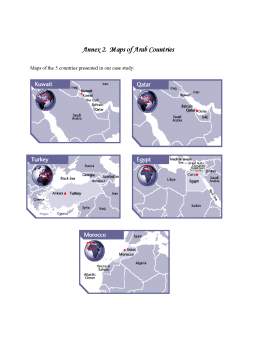Cuprins
- I) Introduction
- II) Cultural Variables
- III) Cultural Value Dimensions
- IV) Management Styles
- V) Analysis and Conclusions
- VI) Appendix 1
Extras din proiect
1. Introduction
The terms “Arab” and “Arabic speaking people” describe a cultural group defined by a common language, history and heritage. There are 22 different Arabic states who are members of the Arabic League. Part of it, are four of the five countries that we are going to talk about: Egypt, Kuwait, Morocco and Qatar. The Arabic nation is Arabic speaking and largely Muslim. There is great diversity in the ethnicity of the nation and in religious practice as well. When professionals are communicating with Arabic elderly, it is preferable to use interpreters who can speak the same dialect, e.g. Lebanese Arabic speaking or Egyptian Arabic speaking. However in general, any Arabic speaker interpreter can be used. The main religion in most Arabic countries is Islam, the second being Christianity, in various forms.
As we introduced you in the Arabic world, we will start to show you in a more accurate and developed research the main factors in a cross cultural managerial relation. First we will discuss the "Cultural Variables" by presenting to you the values, norms and beliefs of the Arabic tradition, and introducing some date about the economy and politics in the five debated countries. In the second part of the project we will discuss about Geert Hofstede’s five dimensions of culture identified as: Power/Distance (PD), Individualism (IDV), Masculinity (MAS), Uncertainty/Avoidance Index (UAI), Long Term Orientation (LTO), and about the seven value dimensions identified by Trompenaars and Hampden-Turner. We will also present the subject of the cultural profiles and management styles in the Arab cluster and their social etiquette, as important as the differences between countries inside the cluster and about the GLOBE cultural dimensions. In the end we will highlight our conclusions about the research we had conducted on the managerial functions of the Arab cultural cluster.
2. Cultural variables
Around the world, different countries have social norms and behaviours that often baffle foreigners. However, a lack of understanding of the differences in social norms and behaviours can lead to many uncomfortable situations and can even have disastrous consequences.
The West believes in organizations and institutions, while Arabs believe in persons (guided by God). Westerners in principle wish to modernize and Arabs strive to find a way of adopting modern modes of behavior without disrupting the traditions they value. This way we can see the major difference between the westerners and Arabs. But the differences do not end here: the values are another important issue - hospitality is more effusive in the Arab world than in the West, they have the tradition of “open house” even to strangers. (A Bedouin will supposedly kill his last camel to feed his guest.)
The main values for the citizens of Arab countries are:
- A patriarchal social structure is the norm, although this is being challenged today.
- Family relationships between the nuclear and extended family are very important, family being central to life.
- Elderly members of the family have a strong role in family decision making, but this is changing with new migrants.
- Family honor is an important cultural value, and extremely important for people who migrated from rural background.
- A great deal of social life revolves around the family events and religious events.
- Arabic people from all religious backgrounds have established their respective religious and social institutions.
- Wearing black when in mourning is still prevalent.
- Arabic people keep close contact with relatives in homeland and often travel to spend their holidays with overseas families. Many send money to support families, some send medicines.
- Arabic people will offer guests food and drink as an essential part of their hospitality.
- Gender issues can effect relationships with the wider community and should be considered when offering a service, matching where possible a client with a worker or interpreter of the same gender.
- Personal relationship is very important in building trust of services or workers.
Many social norms and expectations still mandate modest behaviour. Men and women are not allowed to date, and thus flirting with a woman in public is discouraged and might even have some legal consequences. So serious are they about ensuring that people observe appropriate behaviours in public, morality police are employed at malls to watch for inappropriate activities. The same norms that exist in society also generally apply to interactions between male and female work colleagues. While rules tend to be more relaxed because of the work environment, men and women are generally more distant. Becoming accustomed to the social norms of this or any other society can be frustrating, particularly if you are used to the Western way of doing things. Some people, particularly women, become easily frustrated by the constant expectations for modest behaviour in the company of Arab men. Yet many women have also found that any perceived transgressions on their part are also easily forgiven. Then there are those people who embrace the differences, going so far as to learn the colloquial expressions and behaviours. Generally the locals appreciate these little signs of respect for and appreciation of their heritage.
Preview document
Conținut arhivă zip
- Cultural Profiles and Management Styles Around The World - Egypt, Kuwait, Morocco, Qatar, Turkey.doc






















